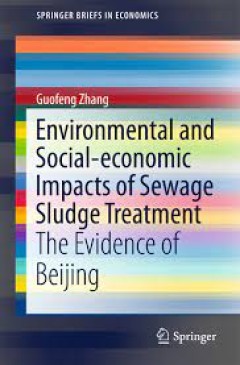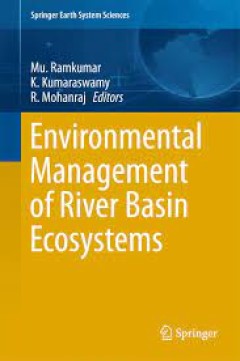Filter by

Environmental and Social-economic Impacts of Sewage Sludge Treatment The Evi…
This book presents an experimental simulation of sewage treatment, which is designed to evaluate the environmental and social-economic impacts of integrated sewage treatment policies. The author puts forward a comprehensive linear optimization simulation model that takes the environmental, energy and economic systems into consideration. Beijing was selected as a typical Chinese city for the pur…
- Edition
- -
- ISBN/ISSN
- 978-981-287-948-6
- Collation
- 28 b/w illustrations, 5 illustrations in colour
- Series Title
- -
- Call Number
- -

Environmental and Resources Geochemistry of Earth System Mass Transfer Mecha…
The Earth system consists of subsystems that include the atmosphere, hydrosphere (water), geosphere (rocks, minerals), biosphere, and humans. In order to understand these subsystems and their interactions, it is essential to clarify the mass transfer mechanism, geochemical cycle, and influence of human activity on the natural environment. This book presents fundamental theories (thermodynamics,…
- Edition
- -
- ISBN/ISSN
- 978-4-431-54904-8
- Collation
- 38 b/w illustrations, 125 illustrations in colour
- Series Title
- -
- Call Number
- -

Environmental Sustainability Role of Green Technologies
Covers different categories of green technologies (e.g. biofuels, renewable energy sources, phytoremediation etc.,) in a nutshell -Focuses on next generation technologies which will help to attain the sustainable development -The chapters widely cover for students, faculties and researchers in the scientific arena of Environmentalists, Agriculturalists, Engineers and Policy Makers The World Env…
- Edition
- -
- ISBN/ISSN
- 978-81-322-2056-5
- Collation
- 26 b/w illustrations, 32 illustrations in colour
- Series Title
- -
- Call Number
- -

Environmental Security of the European Cross-Border Energy Supply Infrastructure
The current volume provides examples of how environmental hazards such as landslides, earthquakes, mountain processes, cold climate processes and tidal flows and currents can affect the energy supply infrastructure. In times of uncertainty, the security of the European cross-border energy supply infrastructure, such as pipelines, has great importance. Whilst the potential effects of political d…
- Edition
- -
- ISBN/ISSN
- 978-94-017-9538-8
- Collation
- 24 b/w illustrations, 74 illustrations in colour
- Series Title
- -
- Call Number
- -

Environmental Project Management Principles, Methodology, and Processes
This book offers a new framework that facilitates the development of more intelligent systems and methods for data analysis and international information sharing, such as the use of satellite imaging and geospatial data to predict changes in weather conditions and shifts in water levels, and to assess the extent of the forest cover remaining on Earth that is visible from space. It brings togeth…
- Edition
- -
- ISBN/ISSN
- 978-3-319-27651-9
- Collation
- 117 b/w illustrations, 32 illustrations in colour
- Series Title
- -
- Call Number
- -

Environmental Politics New Geographical and Social Constituencies
A change in the way humans relate to nature could be the starting point for a new politics, which will also affect relations among humans. A new approach would help to radically transform the production system, not because it is unjust in the usually considered social terms, but because it endangers nature and humanity. So far, the citizens’ grassroots organizations have failed to win broad …
- Edition
- -
- ISBN/ISSN
- 978-3-319-17614-7
- Collation
- XVII, 115
- Series Title
- -
- Call Number
- -

Environmental Policy and Renewable Energy Equipment Exports An Empirical Ana…
This thesis investigates the connection between environmental regulation, technological innovation, and export competitiveness in renewable energy equipment based on a large sample of 225 developed and developing countries from 1990 to 2012. The empirical analysis yields strong supporting evidence for the narrowly strong Porter Hypothesis as well as for the lead market theory. The results sugge…
- Edition
- -
- ISBN/ISSN
- 978-3-658-13558-4
- Collation
- 17 b/w illustrations
- Series Title
- -
- Call Number
- -

Environmental Photochemistry Part III
This volume builds on the previous two editions, Environmental Photochemistry Part I and Part II, which reflect the diverse range of activities in this highly dynamic research field. The chapters cover fundamental topics, from photocatalyst materials, surface-modified materials, reaction kinetics and reactor modelling, to translational research activities on chemical synthesis, energy conversio…
- Edition
- -
- ISBN/ISSN
- 978-3-662-46795-4
- Collation
- 79 b/w illustrations, 70 illustrations in colour
- Series Title
- -
- Call Number
- -

Environmental Management of River Basin Ecosystems
This book offers a unique collection of inter- and multidisciplinary studies on river systems. Rivers have been the prime source of sustenance since the advent of civilization and river systems often form the basis for agriculture, transport, water, and land for domestic, commercial, and industrial activities, fostering economic prosperity. A river basin is a basic geographical and climatologic…
- Edition
- -
- ISBN/ISSN
- 978-3-319-13425-3
- Collation
- 279 b/w illustrations, 8 illustrations in colour
- Series Title
- -
- Call Number
- -

Environmental Management and Governance Advances in Coastal and Marine Resou…
This book deals with recent advances in coastal marine environmental management and governance. Various chapters consider new aspects of conservation, assessment of ecosystem health status, environmental survey and protection, frameworks of ocean service and governance, new applications of geo processing and GIS technology, beach management, aquaculture site selection, assessment of water quali…
- Edition
- -
- ISBN/ISSN
- 978-3-319-06305-8
- Collation
- 33 b/w illustrations, 120 illustrations in colour
- Series Title
- -
- Call Number
- -
 Computer Science, Information & General Works
Computer Science, Information & General Works  Philosophy & Psychology
Philosophy & Psychology  Religion
Religion  Social Sciences
Social Sciences  Language
Language  Pure Science
Pure Science  Applied Sciences
Applied Sciences  Art & Recreation
Art & Recreation  Literature
Literature  History & Geography
History & Geography